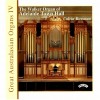Composers
Paul de Maleingreau
| Country: | Belgium |
| Period: | Romantique, Neoclassicism |
Paul de Maleingreau (23 November 1887 - 9 January 1956), a Belgian composer and organist.
Paul Constant Eugène Malengreau was born at Trélon, Nord, France. He later changed his surname to “de Maleingreau”. From 1905 to 1912 he studied at the Brussels Conservatory where his principal teachers were Alfons Desmet, Paul Gilson and Edgar Tinel. He began teaching at the Conservatory in 1913 and was professor of organ (succeeding Desmet) from 1929 until 1953. His pupils included Pierre Froidebise, Charles Koenig, Robert Kohnen, Marcel Druart and Herman Roelstraete.
In 1921 and 1922 he was the first to play Bach’s complete organ works in Brussels.
Gregorian plainsong forms the basis of most of Malengreau’s compositions, and indeed part of his output is intended for the liturgy. He also wrote programme music, his organ symphonies being inspired by paintings by Rogier van der Weyden and the van Eyck brothers. While the chromaticism and cyclic treatment of themes reveal the influence of Franck, certain harmonic progressions are typical of Impressionist music.
He was a member of the Libre Académie, and died in Brussels in 1956.
Refine by search
view all| Country: | Belgium |
| Period: | Romantique, Neoclassicism |
Biography
Paul de Maleingreau (23 November 1887 - 9 January 1956), a Belgian composer and organist.
Paul Constant Eugène Malengreau was born at Trélon, Nord, France. He later changed his surname to “de Maleingreau”. From 1905 to 1912 he studied at the Brussels Conservatory where his principal teachers were Alfons Desmet, Paul Gilson and Edgar Tinel. He began teaching at the Conservatory in 1913 and was professor of organ (succeeding Desmet) from 1929 until 1953. His pupils included Pierre Froidebise, Charles Koenig, Robert Kohnen, Marcel Druart and Herman Roelstraete.
In 1921 and 1922 he was the first to play Bach’s complete organ works in Brussels.
Gregorian plainsong forms the basis of most of Malengreau’s compositions, and indeed part of his output is intended for the liturgy. He also wrote programme music, his organ symphonies being inspired by paintings by Rogier van der Weyden and the van Eyck brothers. While the chromaticism and cyclic treatment of themes reveal the influence of Franck, certain harmonic progressions are typical of Impressionist music.
He was a member of the Libre Académie, and died in Brussels in 1956.




![Great European Organs. 41-John Scott Whiteley [York Minster]](http://static.classicalm.com/repository/collection-cover/small/921-img1341919338119775.jpg)